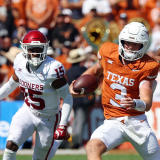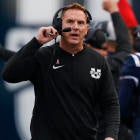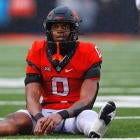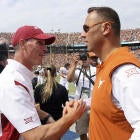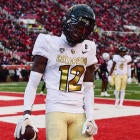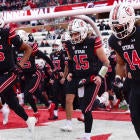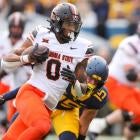
Federal oversight of name, image and likeness rights for college athletes took a significant step Thursday with the submission of The Student Athlete Level Playing Field Act. The bill, sponsored by U.S. Reps. Anthony Gonzalez (R-Ohio) and Emanuel Cleaver (D-Missouri), is a bipartisan effort that would provide federal NIL oversight.
The NCAA has been battling how to retain some control over the issue while asking Congress for an antitrust exemption. However, this bill making its way through the U.S. House of Representatives does not provide that exemption from lawsuits emerging over implementing NIL.
"There isn't one reason why [there is no exemption,'" Gonzalez told CBS Sports. "I would say, through the course of talking through a piece of legislation and trying to balance all the different priorities, we felt the right thing to do was leave as it is on the antitrust front."
Some kind of federal intervention on the NIL issue seems destined. The NCAA had ignored it for so long that at least 20 states have passed or considered NIL laws. Florida's law goes into effect first July 1, 2021. That reality forced the NCAA to choose a path through the federal government that would supersede those state laws.
In December 2019, NCAA president Mark Emmert met with legislators in Washington, D.C. "We need your help right now," Emmert told them.
"The reality -- with Florida's law coming on the books by the middle of next year -- we needed to get something out there," Gonzalez said.
The NCAA does not allow its athletes to capitalize financially on what is a birthright for the rest of us: their names, images and likenesses. Several legal and ethical challenges brought the NCAA to the point of implementing NIL while asking for federal help.
"I want to be unequivocally clear: This is a civil rights issue," Cleaver said. "For far too long, college athletes across the country -- many of whom are people of color -- have been denied the basic right to control their name, image and likeness."
Its supporters say the bipartisan nature of the bill gives it a good chance to pass in these divisive times.
"The sad reality of Washington is most people just do things on their own partisan [sideline] and nothing ever gets done," Gonzalez said. "We wanted to take a different approach from the very beginning."
The bill addresses one of the biggest NIL concerns -- recruiting. The law would make it "unlawful for a booster to directly or indirectly provide any funds or thing of value as an inducement for a student-athlete to enroll."
That part of the law would amend the Sports Agent Responsibility and Trust Act. Violation of the law would be a civil, not criminal, violation for rogue boosters. That still could result in "very minor misdemeanor-like" penalties, according to a legal source.
Still, that could conceivably mean federal penalties for an NCAA violation. Following the FBI cases into college basketball corruption in 2017, the NCAA investigated wrongdoers after they were penalized under federal law for infractions such as wire fraud.
Bill co-sponsor Rep. Jeff Duncan (R-South Carolina) is a former Clemson walk-on.
"I understand first-hand the need to create a fair system for student-athletes while maintaining the integrity and distinctiveness of college sports," Duncan said. "I believe this bill does just that, and it does it in a way that is impartial for all athletes across the country and not just a small group in certain states."
Athletes and agents would have to notify a school within 72 hours of entering into an agreement. With NIL, there is the emerging reality that, someday soon, agents would be across the table from athletic directors and coaches discussing a player's NIL earning opportunities.
The bill would also allow players to sign deals with both the school's apparel sponsor and a competing sponsor. The difference being the athlete couldn't wear that competing apparel sponsor in a game or contest.
Neither of those options are allowed in the 31-page comprehensive report submitted by the NCAA's NIL working group in April.
"If you go to a Nike school, you could sign an Under Armour deal," Gonzalez explained. "What you could not do is wear that Under Armour gear on the field. You can't basically undercut the apparel contract with the school. You could also enter into an apparel contract with the same provider. Ohio State could have a Nike contract, and you as an athlete could also have a Nike contract."
In other words, if a school was getting $500,000 from Nike per year, why couldn't athletes be allowed to get an extra $100,000 from that sponsor?
"We'll see how it evolves," said Gonzalez, a former Ohio State wide receiver. "Everybody wants to try to predict everything that's going to happen from a market standpoint. I don't think you can do that. Our focus was always, let's just grant this economic right to the student-athlete."
The Student Athlete Level Playing Field Act follows a similar NIL bill submitted by Sen. Marco Rubio (R-Florida) in June. More bills providing even more expansive NIL athlete rights are expected to follow.
"[The Gonzalez bill is] a balance of empowerment and enforceability," said Blake Lawrence, CEO of Opendorse, a technology-based social media firm. "Specifically the part about preventing athletes from endorsing conflicting sponsors. Whatever federal legislation comes down on NIL is certain to include that."
The law would establish the Covered Athletic Organization Commission, which would act as an independent resolution body between a player and a school/NCAA.
The commission would be staffed with ADs, coaches, players, conference administrators and professionals in sports marketing, contracting and public relations.
The law would be overseen by the Federal Trade Commission. Such government oversight of NIL would theoretically clash with the NCAA, which is currently taking requests for proposal from entities to be that third-party administrator.
"Our purpose with that third party is it's a temporary commission, and it doesn't have force of law," Gonzalez said. "It can't create new law. The law is the law. What that third party can do is advise Congress going forward."
The NCAA's working group will submit formal recommendations next month. The NCAA is expected to take up NIL as formal legislation at its January convention.
By that time, it may be too late for the NCAA. One industry source speculated that whatever comes out of that NCAA legislation will limit athletes' earning power so much that it will draw federal attention anyway.
"If and when this bill gets signed into law, this becomes the law of the land," Gonzalez said. "All discussions on NIL are basically answered by that piece of legislation."
Gonzalez said he hoped the bill could get passed by early next year.
"We greatly appreciate U.S. Reps. Gonzalez and Cleaver's collaboration to sponsor bipartisan legislation to strengthen the college athlete experience," the NCAA said in a statement. "We look forward to working together with both representatives, their co-sponsors and other members of Congress to further establish a legal and legislative environment where our schools can continue to support student-athletes within the context of higher education."


